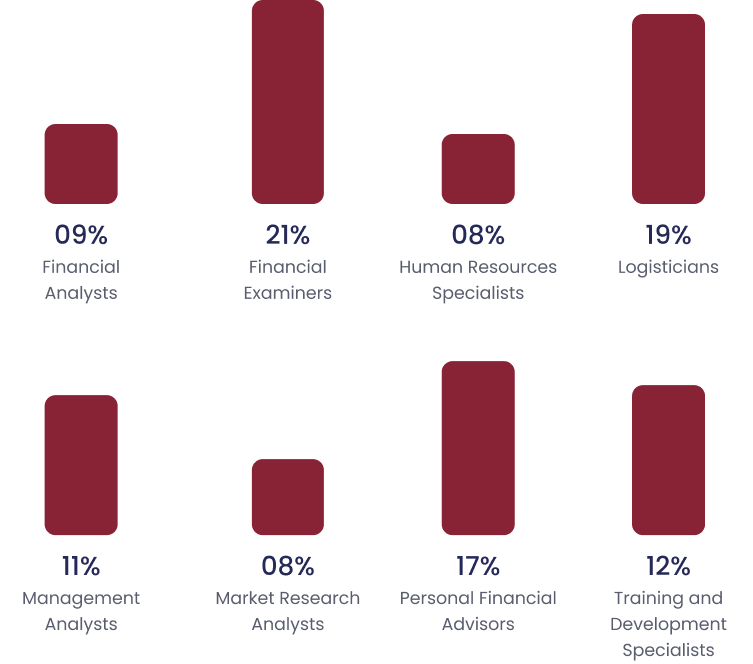Explore Business Careers
Choosing a career path in business opens a world of opportunities for ambitious professionals like you. The business sector encompasses a vast array of roles across diverse industries, from finance and marketing to human resources and operations. Business careers offer potential for growth, leadership development, and the chance to make a significant impact on companies and organizations.
Educational Pathways for Business Careers
Undergraduate Degrees
Graduate Studies and MBAs
Alternative Education and Specializations
Find Your Online Business College
Career Opportunities in Business
Business Management Career Paths
Business management encompasses a wide range of roles focused on organizational leadership and strategy. As a business operations manager, you’ll oversee daily operations and develop long-term plans to improve efficiency and profitability.
Operations research analysts use advanced analytical methods to help organizations make better decisions. This career combines business acumen with mathematical modeling.
Economics Career Paths
Economics careers blend analytical skills with business knowledge to interpret market trends and inform decision-making. As an economist, you’ll study economic issues, conduct research, and provide insights to businesses and policymakers.
Entrepreneurship and Business Development Career Paths
Entrepreneurship offers the opportunity to turn innovative ideas into successful ventures. As a startup founder, you’ll wear many hats, from product development to marketing and finance.
Financial Sector Career Paths
The financial sector offers numerous career paths for those with strong analytical and numerical skills in accounting or finance. Financial managers oversee an organization’s financial health, making strategic decisions about investments and long-term financial planning.
Human Resources Career Paths
Human resources (HR) careers focus on managing an organization’s most valuable assets: its people. HR managers oversee recruitment, employee relations, and company culture.
Marketing Career Paths
Marketing careers blend creativity with business strategies to promote products and services. Market research analysts study market conditions and consumer behavior to inform marketing strategies.
Operations and Supply Chain Career Paths
Operations and supply chain careers focus on optimizing business processes and resource management. Supply chain managers oversee the entire product lifecycle, from sourcing raw materials to delivering finished goods to customers.
Did You Know?

High school graduates earn on average
$899 per week

Bachlelor’s graduates earn on average
$1,493 per week

Skillsets for Business Professionals
Core Business Competencies
- To excel in business, you must cultivate fundamental skills. Critical thinking is essential for analyzing complex situations and making sound decisions. You’ll need strong problem-solving abilities to tackle challenges effectively.
- Financial acumen is crucial. Understanding budgets, profit margins, and financial statements will help you make informed decisions. Develop your knowledge of basic accounting principles and financial management.
- Project management skills are valuable across industries. Learn to plan, execute, and monitor projects efficiently. Familiarize yourself with popular project management methodologies and tools.
- Time management and organization are key. Prioritize tasks, meet deadlines, and maintain a productive workflow. Utilize digital tools and apps to enhance your efficiency.
Specialized Technical Skills
- In today’s digital age, technical proficiency is increasingly important. Develop your data analysis skills to extract insights from large datasets. Learn to use spreadsheet software and basic statistical tools.
- Familiarize yourself with data visualization techniques to present information effectively. Master tools like Tableau or Power BI to create compelling visual representations of data.
- Enhance your digital marketing knowledge. Understand SEO principles, social media strategies, and content marketing techniques. These skills are valuable across various business functions.
Interpersonal and Leadership Abilities
- Strong communication skills are essential in business. Practice clear and concise writing for emails, reports, and presentations. Hone your public speaking abilities to confidently address groups.
- Develop your emotional intelligence. Understand and manage your emotions and empathize with others. This skill is crucial for building strong relationships and resolving conflicts.
- Cultivate your leadership potential. Learn to motivate and inspire others, delegate tasks effectively, and provide constructive feedback. Practice active listening to better understand your team’s needs.
- Sharpen your negotiation skills. Learn to find win-win solutions in various business scenarios. Develop strategies for handling difficult conversations and reaching mutually beneficial agreements.
Find Your Online Business College
Industry Insights and Analytics
Economic Impact and Business Analytics
Business analytics has a significant impact on economic performance across various sectors. The U.S. Bureau of Labor Statistics reports strong job growth in this field, reflecting its importance. You can expect competitive salaries in analytics roles, with median salaries often exceeding industry averages.
- Identify market trends
- Optimize resource allocation
- Predict consumer behavior
- Manage financial risks
Business Standards and Compliance
- Analyzing financial reports for accuracy and compliance
- Developing and monitoring budgets
- Assessing and mitigating financial risks
- Ensuring adherence to industry-specific regulations
Professional Development and Advancement
Continuing Education and Certifications
To stay competitive in the business world, you should prioritize ongoing learning. Pursue a degree in business administration or related fields to build a strong foundation. Consider specialized certifications like Project Management Professional (PMP) or Certified Public Accountant (CPA) to demonstrate expertise in your chosen area.
Advancing in a Business Career
- Set clear career goals
- Seek mentorship from senior professionals
- Take on challenging projects
- Develop leadership skills through team management
- Build cross-functional expertise
Frequently Asked Questions







